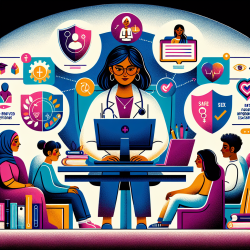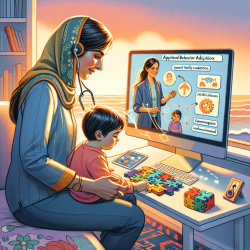Introduction
In the realm of online therapy services, the integration of data-driven decisions is crucial for enhancing outcomes, particularly in the context of sexual health literacy. The research titled "An Interactive Web-Based Sexual Health Literacy Program for Safe Sex Practice for Female Chinese University Students: Multicenter Randomized Controlled Trial" offers valuable insights into the effectiveness of web-based interventions. This blog explores how practitioners can leverage these findings to improve their skills and encourage further research.
Understanding the Research
The study conducted a multicenter randomized controlled trial involving 781 female university students in Hong Kong. Participants were divided into two groups: one received an interactive web-based intervention, while the other accessed a single webpage on condom use. The primary outcome measured was the consistency of condom use, while secondary outcomes included knowledge, attitudes, norms, and self-efficacy regarding condom use.
Key Findings
- The intervention group showed a temporary improvement in knowledge, attitudes, norms, and self-efficacy regarding condom use at the 3-month follow-up.
- However, there was no significant long-term behavioral change in the consistency of condom use compared to the control group.
- The study highlights the need for personalized and proactive approaches in web-based interventions to achieve sustained behavioral change.
Implications for Practitioners
For practitioners providing online therapy services, this research underscores the importance of tailoring interventions to individual needs. Here are some actionable steps practitioners can take:
- Personalization: Customize intervention content to address specific characteristics of the target audience, such as sexual orientation and cultural context.
- Active Engagement: Incorporate interactive elements and personalized feedback to enhance participant engagement and retention.
- Continuous Monitoring: Implement follow-up assessments to track progress and adjust interventions as needed to maintain long-term behavioral change.
Encouraging Further Research
The findings from this study pave the way for future research in the field of sexual health literacy. Researchers are encouraged to explore:
- The effectiveness of different delivery methods, such as virtual reality, in enhancing sexual health literacy.
- The impact of personalized interventions on diverse populations, including sexual minorities and individuals with varying levels of health literacy.
- The role of digital platforms in providing confidential and accessible sexual health education to young adults.
Conclusion
Web-based interventions hold great potential for improving sexual health literacy among university students. By adopting personalized and proactive approaches, practitioners can enhance the effectiveness of these interventions and contribute to better health outcomes. To read the original research paper, please follow this link: An Interactive Web-Based Sexual Health Literacy Program for Safe Sex Practice for Female Chinese University Students: Multicenter Randomized Controlled Trial.










